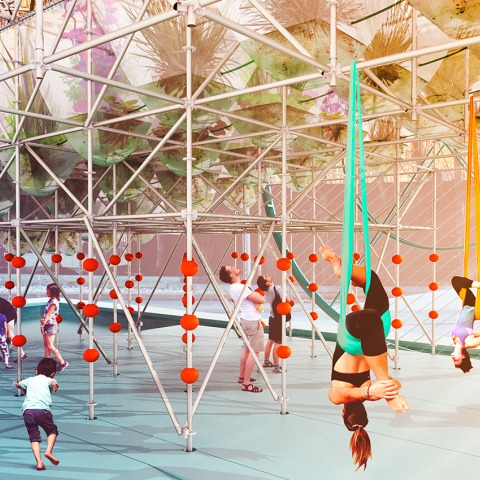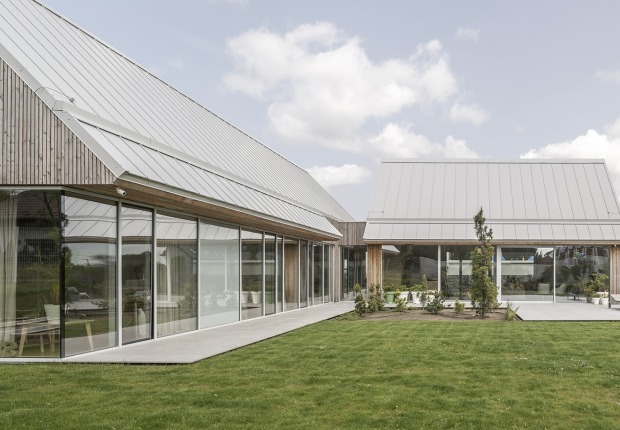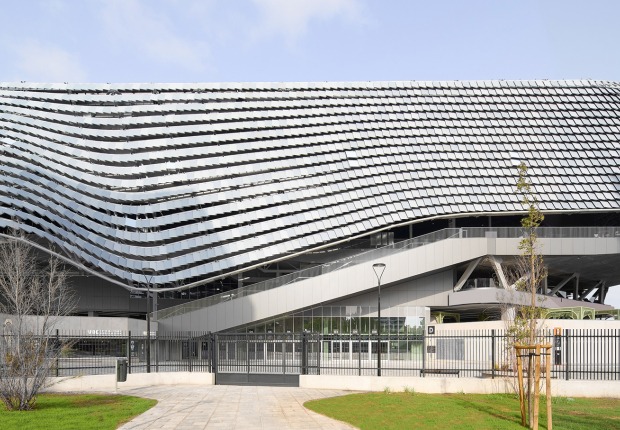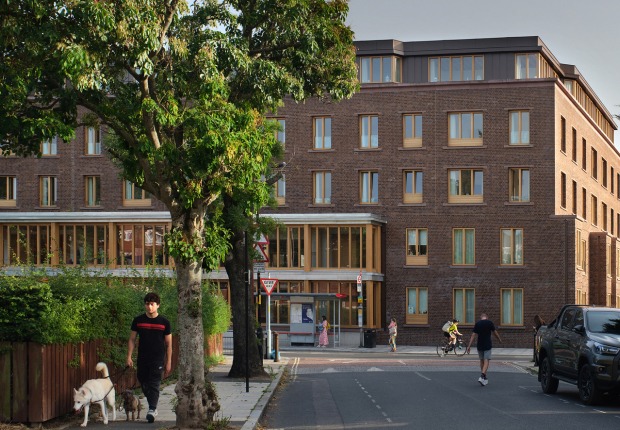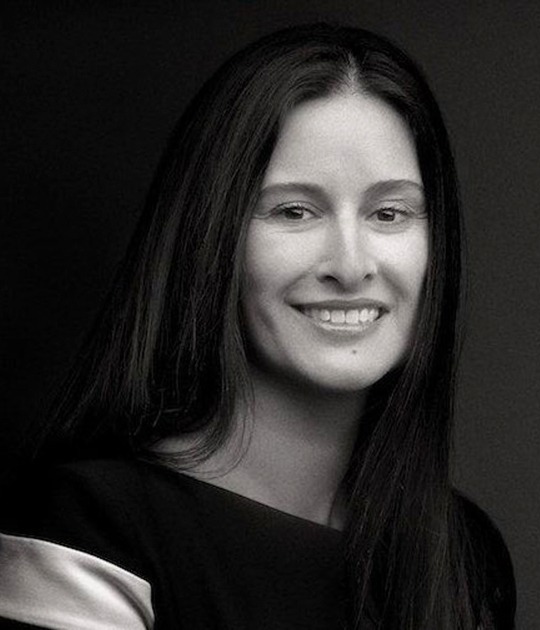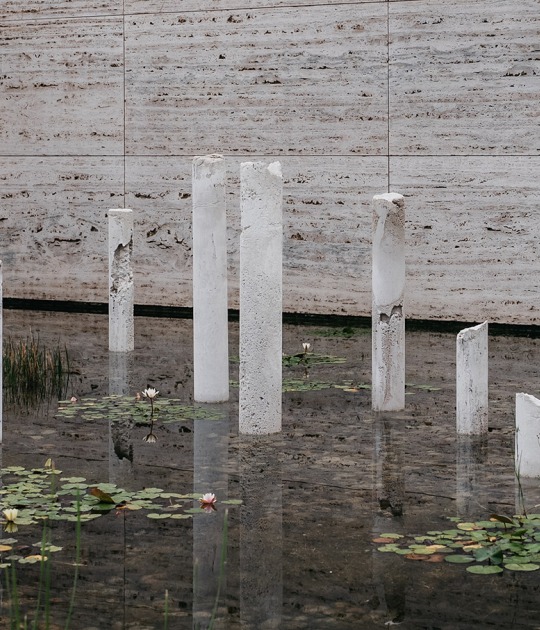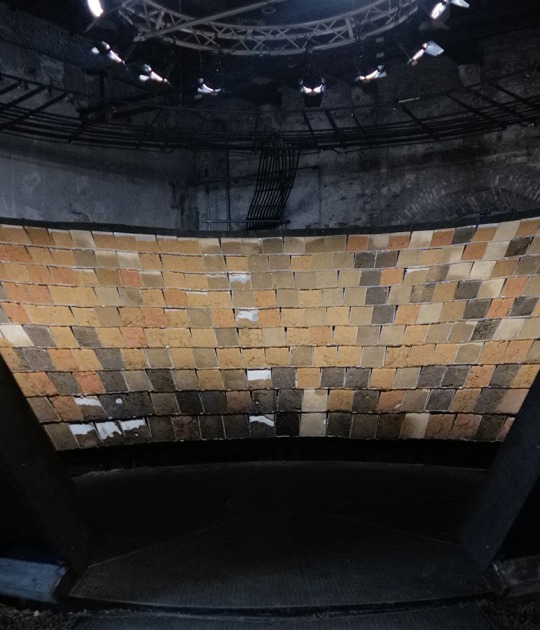For the sixth year in a row, the summer Program for Young Architects [YAP] is held again, a program to promote and support the young architecture organized by the MAXXI in collaboration with MoMA/MoMAPS1 in New York [USA], Constructo de Santiago Chil, Istanbul Modern [Turkey] and MMCA National Museum of Modern and Contemporary Art Seul [Korea]. The Italian group deltastudio has been finalist with his project Albula, an open source system capable of purifying water of the Tiber River, near the museum, to the point of making it fit for human consumption.
Albula is an interactive urban device that addresses the pollution crisis of the Tiber river and its degradation. The installation is both urban space and metaphor of the water mills that populated the river in the past, recalling a forgotten popular imagination. If in the past the mill generated energy using the river flow, here in the MAXXI square, Albula, regulated by a “reverse ecology”, will use human flow to purify Tiber water and to return it to the city.
The project proposes a suspended integrated system of phytoremediation, fulfilling requests of meeting, cooling and shading. The plant species choice is determined on the basis of informations about Tiber water pollution in 2015 (ARPA Lazio data). In this configuration, the installation manages a total of 10,000 liters of water, purifying 2,000 liters collected directly from the Roman river and poured in the first three rows of sacks. The clean water obtained at the end of the phytoremediation cycle can be used for human use in accordance with existing rules.
The installation is composed by four elements: a platform/raft, a T shaped metal structure -to which the phytoremediation sacks are hooked- the waterwheel and the collecting tank. The covering consists of a layer of Tiber water, contained inside the sacks, which provides shade in the public space below. Each sack is designed as a micro-ecosystem with different size, in which the plants behave as natural pumps capable of absorbing pathogens, chemicals and heavy metals.
The interaction between man and phytoremediation system is provided by Arduino, a programmable low- cost circuit board able to interact with the environment in which it is located. The position of the body is detected by the different ultrasonic proximity sensors connected via the card to an electric motor which, by operating the hydraulic wheel, triggers the fall water flow inside the sacks.
Albula is an open source project, designed as a scalable model that can be replicated in different contexts. For this reason, it is distributed under the Creative Commons license BY-NC-SA 3.0, together with the script that controls the Arduino electronic board functioning and proximity sensors.
The result is a captivating and playful structure designed with a demonstrative intent to contribute to the re-appropriation of the river flowing so close to urban flows generated by MAXXI. To make that Rome is not the last of the big cities that falls back in love with its river.
Albula is an interactive urban device that addresses the pollution crisis of the Tiber river and its degradation. The installation is both urban space and metaphor of the water mills that populated the river in the past, recalling a forgotten popular imagination. If in the past the mill generated energy using the river flow, here in the MAXXI square, Albula, regulated by a “reverse ecology”, will use human flow to purify Tiber water and to return it to the city.
The project proposes a suspended integrated system of phytoremediation, fulfilling requests of meeting, cooling and shading. The plant species choice is determined on the basis of informations about Tiber water pollution in 2015 (ARPA Lazio data). In this configuration, the installation manages a total of 10,000 liters of water, purifying 2,000 liters collected directly from the Roman river and poured in the first three rows of sacks. The clean water obtained at the end of the phytoremediation cycle can be used for human use in accordance with existing rules.
The installation is composed by four elements: a platform/raft, a T shaped metal structure -to which the phytoremediation sacks are hooked- the waterwheel and the collecting tank. The covering consists of a layer of Tiber water, contained inside the sacks, which provides shade in the public space below. Each sack is designed as a micro-ecosystem with different size, in which the plants behave as natural pumps capable of absorbing pathogens, chemicals and heavy metals.
The interaction between man and phytoremediation system is provided by Arduino, a programmable low- cost circuit board able to interact with the environment in which it is located. The position of the body is detected by the different ultrasonic proximity sensors connected via the card to an electric motor which, by operating the hydraulic wheel, triggers the fall water flow inside the sacks.
Albula is an open source project, designed as a scalable model that can be replicated in different contexts. For this reason, it is distributed under the Creative Commons license BY-NC-SA 3.0, together with the script that controls the Arduino electronic board functioning and proximity sensors.
The result is a captivating and playful structure designed with a demonstrative intent to contribute to the re-appropriation of the river flowing so close to urban flows generated by MAXXI. To make that Rome is not the last of the big cities that falls back in love with its river.
